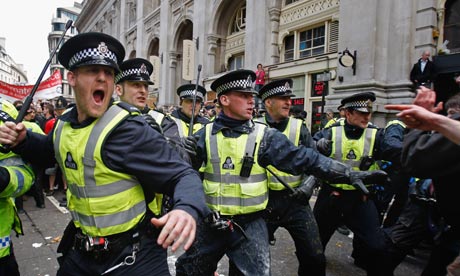An Activists Guide to Police Tactics
March 3, 2011
“The people whose jobs were destroyed were in no way responsible for the excesses of the financial sector and the crisis that followed…I’m surprised the real anger hasn’t been greater than it has.”
The Governor of the Bank of England, Mervyn King March 1st 2011
“Students, activists, agitators, stoners, scratters, scrotes. You will be hit with sticks and sent home to mummy. The rule of law will prevail, order will be restored, Winston will not be shamed, my ancestors will not have died to have allowed you to bring shame on England. You will get up early, get out of your bed, seek work and contribute to the greater good.”
Post on Inspector Gadget Police blog December 2010
“Following the student protests in London on 10 November 2010, where greater numbers gathered than had been anticipated by police, and the incursion of the Conservative Party headquarters in Millbank, the Metropolitan Police Commissioner Sir Paul Stephenson stated that ‘the game has changed’3. The character of protest is evolving in terms of: the numbers involved; spread across the country; associated sporadic violence; disruption caused; short notice or no-notice events, and swift changes in protest tactics. After a few, relatively quiet years, this is a new period of public order policing – one which is faster moving and more unpredictable. Foreseeing the character of events will prove more difficult and, in some cases, their nature and mood will only become apparent on the day.”
HMIC feb 2011 Adapting to Protest and Nurturing the British Model of Policing
Public Order tactics used by the British Police have their origin in colonial rule. From that starting point they were refined through the experience of Northern Ireland and the riots of the 1980’s to form today’s set of Quasi-military tactics where lines of police attempt to control, contain or disperse crowds of protesters. The rise of a spontaneous, decentralised protest movement and increased anger directed at the police set against a deepening economic crisis has led to calls for a tougher approach to public ‘disorder’. The demonstration against the coalition governments economic policy on March 26th will be the biggest showdown London has seen since the poll tax riot of 1989 and will be a defining moment in how the state polices mass dissent. The following is a user’s guide to understanding police tactics and capabilities culled mostly from police sources, specifically “ACPO Manual of Guidance on KEEPING THE PEACE” 2010 as well as various police blogs and forums:
